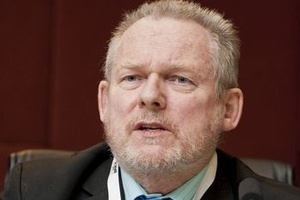South Africa ‘seeks balance’ between intellectual property, public health
The government’s policy on intellectual property (IP), currently under discussion, would seek to strike a balance between the needs of public health and the interests of innovative pharmaceutical companies, Trade and Industry Minister Rob Davies said on Tuesday.
His department released a draft national policy on intellectual for public comment on September 4. While the policy is wide-ranging, one of the areas that has come in for closest public attention is that of health, as activists see the policy drafting process as an opportunity to lobby for measures they believe will lower the price of medicines.
Briefing journalists on the response to the draft policy, which elicited submissions representing more than 300 stakeholders, Mr Davies said the aim of the its health-related provisions was to bring South Africa’s laws in line with international agreements, including the World Trade Organisation’s Trade Related Aspects of Intellectual Property Rights (TRIPS), which has legal flexibility measures that effectively allow countries to break patents on medicines in a public health emergency.
"We are the world capital of HIV/AIDS, we have (a) serious burden of TB linked to that … and we have to have the freedom and ability to use the policy space that’s been made available to us under TRIPS and public health for us to take that option," he said.
The Doha agreement on TRIPS and public health allows countries to break patents by issuing compulsory licences to local manufacturers of generic medicines. These provisions are intended to be used in a public health emergency, and have been used by countries such as Brazil and Thailand to break patents on HIV medicines.
But although the Medicines and Related Substances Act contains measures enabling compulsory licences, they have never yet been applied in South Africa.
Critics such as Medicines Sans Frontières have previously said the act’s provisions for compulsory licenses are so cumbersome it would take two years to get one issued. The Doha declaration also allows parallel importation of medicines, which means a company or nongovernmental agency can import a patented drug from another country where the same product is sold at a lower price.
"Although we’ve been a major champion of all these processes internationally we haven’t necessarily incorporated them into domestic law. That’s one of the issues that we need to follow through," said Mr Davies. "I’ve interacted with a few of the patent medicine manufacturers, saying to them ‘we are not doing anything that you won’t be familiar with in other jurisdictions’," he said.
In a press statement issued after the briefing, his department said the South African Patents Act made no provisions for parallel importation and was therefore out of kilter with the Doha declaration. "South Africa will amend its legislation to address issues of parallel importation and compulsory licensing in line with the Doha decision of the WTO on IP and health," it said.
Mr Davies dismissed criticism from commentators that the draft intellectual property policy was vague and confusing, saying it was not a finished product and was intended to be a point of discussion.
The Department of Trade and Industry also said its draft intellectual property policy sought to update South Africa’s copyright legislation, which dated back to 1978 and failed to take account of advances in digital technology.
Copyright legislation needed to be brought in line with recent World Intellectual Property Organisation treaties, including the Beijing treaty and the Marrakesh treaty, it said.
"The government is looking at the issue of collective management of royalties in view of complaints from industry stakeholders," it said.
Source: BDlive


